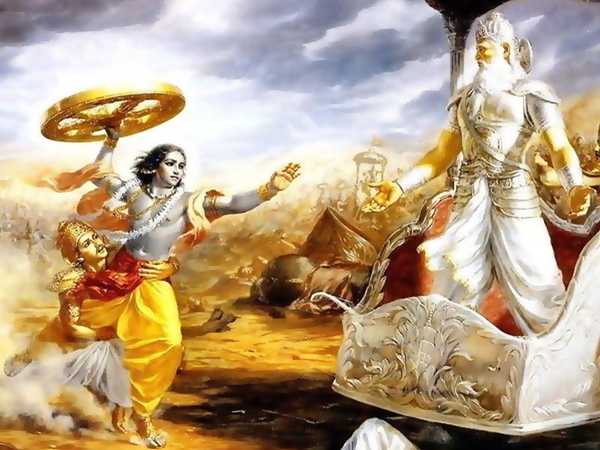Chapter 103

“Vaisampayana said, ‘The unfortunate Satyavati then became plunged ingrief on account of her son. And after performing with herdaughters-in-law the funeral rites of the deceased, consoled, as best shecould, her weeping daughters-in-law and Bhishma, that foremost of allwielders of weapons.
And turning her eyes to religion, and to thepaternal and maternal lines (of the Kurus), she addressed Bhishma andsaid ‘The funeral cake, the achievements, and the perpetuation of theline of the virtuous and celebrated Santanu of Kuru’s race, all nowdepend on thee. As the attainment of heaven is inseparable from gooddeeds, as long life is inseparable from truth and faith, so is virtueinseparable from thee. O virtuous one, thou art well-acquainted, indetail and in the abstract, with the dictates of virtue, with variousSrutis, and with all the branches of the Vedas; know very well that thouart equal unto Sukra and Angiras as regards firmness in virtue, knowledgeof the particular customs of families, and readiness of inventions underdifficulties. Therefore, O foremost of virtuous men, relying on theegreatly, I shall appoint thee in a certain matter. Hearing me, itbehoveth thee to do my bidding. O bull among men, my son and thy brother,endued with energy and dear unto thee, hath gone childless to heavenwhile still a boy. These wives of thy brother, the amiable daughters ofthe ruler of Kasi, possessing beauty and youth, have become desirous ofchildren. Therefore, O thou of mighty arms, at my command, raiseoffspring on them for the perpetuation of our line. It behoveth thee toguard virtue against loss. Install thyself on the throne and rule thekingdom of the Bharatas. Wed thou duly a wife. Plunge not thy ancestorsinto hell.’
“Vaisampayana continued, ‘Thus addressed by his mother and friends andrelatives, that oppressor of foes, the virtuous Bhishma, gave this replyconformable to the dictates of virtue, ‘O mother, what thou sayest iscertainly sanctioned by virtue. But thou knowest what my vow is in thematter of begetting children. Thou knowest also all that transpired inconnection with thy dower. O Satyavati, I repeat the pledge I once gave,viz., I would renounce three worlds, the empire of heaven, anything thatmay be greater than that, but truth I would never renounce. The earth mayrenounce its scent, water may renounce its moisture, light may renounceits attribute of exhibiting forms, air may renounce its attribute oftouch, the sun may renounce his glory, fire, its heat, the moon, hiscooling rays, space, its capacity of generating sound, the slayer ofVritra, his prowess, the god of justice, his impartiality; but I cannotrenounce truth.’ Thus addressed by her son endued with wealth of energy,Satyavati said unto Bhishma, ‘O thou whose prowess is truth, I know ofthy firmness in truth. Thou canst, if so minded, create, by the help ofthy energy, three worlds other than those that exist. I know what thy vowwas on my account. But considering this emergency, bear thou the burdenof the duty that one oweth to his ancestors. O punisher of foes, act insuch a way that the lineal link may not be broken and our friends andrelatives may not grieve.’ Thus urged by the miserable and weepingSatyavati speaking such words inconsistent with virtue from grief at theloss of her son, Bhishma addressed her again and said, ‘O Queen, turn notthy eyes away from virtue. O, destroy us not. Breach of truth by aKshatriya is never applauded in our treatises on religion. I shall soontell thee, O Queen, what the established Kshatriya usage is to whichrecourse may be had to prevent Santanu’s line becoming extinct on earth.Hearing me, reflect on what should be done in consultation with learnedpriests and those that are acquainted with practices allowable in timesof emergency and distress, forgetting not at the same time what theordinary course of social conduct is.'”




